The power of informal institutions:The impact of clan culture on the depression of the elderly in rural China
2021-03-23LIUXiaohongWANGWeidongZHANGLinxiu
LIU Xiao-hong,WANG Wei-dong,ZHANG Lin-xiu
1 China Center for Agricultural Policy,School of Advanced Agricultural Sciences,Peking University,Beijing 100871,P.R.China 2 School of Economics and Management,Beijing Forestry University,Beijing 100083,P.R.China 3 UN Environment-International Ecosystem Management Partnership (UNEP-IEMP),Beijing 100101,P.R.China 4 Key Laboratory of Ecosystem Network Observation and Modeling,Institute of Geographic Sciences and Natural Resources Research,Chinese Academy of Sciences,Beijing 100101,P.R.China
Abstract Exploration of ways to improve the subjective welfare of residents is an important area of current academic research. Using data from the China Family Panel Studies survey conducted in 2010,this paper investigated the impact of clan culture on the mental health of elderly people in rural China. The results demonstrated that clan culture can significantly decrease the depression score of the rural elderly. Further,there was no gender difference with respect to the impact of clan culture on the depression score of the elderly. At the same time,the positive effects of clan culture on the depression score of the elderly have gradually weakened with economic development. Exploration of the mechanisms involved indicated that in areas with stronger clan culture,older people receive more social support. This study enriches our understanding of the impact of informal institutions on the welfare of rural residents. At the same time,it can also provide a certain decisionmaking reference for the government to formulate relative poverty relief strategies in a new stage of poverty alleviation.
Keywords:clan culture,the elderly,depression,rural China,social support
1.Introduction
China’s aging population and the associated problems are becoming increasingly pronounced,especially in rural areas.The international standard definition of an aging society is when the proportion of the population over 60 years of age accounts for 10% of the total population. Data from the sixth census in 2010 showed that 13.3% of China’s population was aged 60 years or over. More importantly,the proportion of people aged over 60 in rural China is closer to 15%. Both of these ratios are much higher than the international standard for aging societies. Furthermore,the problem of the aging population in China will become increasingly serious. Based on data from the United Nations Population Division,it is estimated that the proportion of China’s population over 60 years of age will reach 31.1%by 2050 (Zhang and Chen 2014).
Together with the aging population,the health status of the elderly is a cause for concern. In particular,the mental health of elderly people requires more attention. In 2016,China formally issued and implemented the Healthy China 2030 Plan,giving priority to the development of citizens’health. The plan places special emphasis on strengthening the development and standardized management of a mental health service system to promote mental health.Recently,the physical health of rural elderly people has also received increasing attention (Gu and Qiao 2006; Liuet al.2011; Chenget al.2015). According to the World Health Organization’s concept of “healthy aging”,health is defined as a complete state of physiological health,psychological health,and other aspects of human wellbeing (Hao and Hu 2010). Heet al.(2016) found that 36.94% of the elderly population in rural China were prone to depression,and the proportion of females with depressive tendencies was significantly higher than that of males. Liet al.(2009) found that the suicide rate of people aged over 65 years was the highest among all age groups in China,and that the suicide rate in rural areas was much higher than that in urban areas.
Absolute poverty has been eliminated in China,and the focus of China’s poverty reduction strategy will also shift to alleviating relative poverty. The outbreak and persistence of the COVID-19 pandemic has brought more challenges to China’s poverty reduction in the future (Luoet al.2020).In this context,more attention should be paid to the welfare of the vulnerable group of rural elderly people. The mental health of the elderly population in rural areas affects the quality of life of elderly individuals and their families. Poor mental health among the rural elderly is likely to increase the burden on the family and the probability of return to poverty; in turn,it will also pose challenges to China’s poverty reduction in the future. Thus,even with socioeconomic development and improvements to material life in China,increased attention should be paid to the mental health of the elderly.
In recent years,researchers have begun to focus on the mental health of the elderly in China. For example,He (2002) found that the higher the socio-economic status and the stronger the social support networks of a family,in general,the greater the physical and mental health of the elderly. Tao and Shen (2014) explored the impact of formal and informal social support on the physical and mental health of rural elderly. However,this study ignored the power of clan culture in rural areas where the formal support system is less available,and hence,the effect of such culture on the health of the elderly was not evaluated. In the context of the urban–rural dual system in China,the rural social insurance system,including pensions and medical care,is not perfect. Therefore,it is especially important to explore,in rural areas,the impact of informal systems on the improvement of residents’ welfare,where clan culture is a significant aspect of such informal systems.
As a key part of informal institutions,culture plays an important role in social and economic development(Williamson 2009; Fernández 2011; Alesina and Giuliano 2015). In turn,clan culture is an important part of Chinese traditional culture,which thrives in the vast rural areas of China and shapes the daily lives of rural residents. Clan culture has significant impacts on issues such as rural labor-mobility choices,entrepreneurial behavior in rural regions,and the development of private enterprises in those areas (Guo and Yao 2013; Chen and Chen 2018; Zhang 2019a; Zhuet al.2019). At the same time,clan culture is also influential in individual pension choices and affects education gaps,among other aspects of rural life (Dinget al.2018; Zhang and Ma 2017; Zhang 2019b). Studies have also examined the impact of clan culture on the land-rental market,income distribution,public finances,and the implementation of village democracy in rural China (He and Tong 2002;Guoet al.2014; Wuet al.2016; Guo and Wang 2017).Nevertheless,research on the socio-economic impacts of clan culture is still in its infancy (Zhang and Li 2015).Furthermore,no research to date has attempted to analyze the impact of clan culture on the mental health of the rural elderly. Therefore,this paper aims to address some of these research gaps and to stimulate further inquiry in this area.
China is a society that values morality and ethics (Wang J B 2013). Thus,the sociologist Xiaotong Fei argued that,historically,Chinese society emerged as a fundamentally relational society based on morality and ethics with a disparity structure,i.e.,a hierarchy of social statuses or ranks (Fei 1998). Within the clan,many informal rules,which are the embodiment of clan culture,serve to regulate people’s behavior (Li 1994). Because of the economic development and social changes that have occurred since the founding of the People’s Republic of China,a series of changes have taken place in the internal structure as well as the external environment of clan culture (Li 1994; Jiang 2006). Nonetheless,some of the internally established rules still restrict or otherwise affect people’s behavior. Although these rules are not mandatory,they subtly influence many aspects of people’s lives. Among these rules or norms,those with particular relevance for this study include the many characteristics of clan culture that emphasize the need for the younger generations of families to support older generations. This feature of the informal social support system embodied by clan culture is likely to have a positive impact on improving the mental health of the elderly. Based on these considerations,we proposed research Hypothesis I:Clan culture can significantly reduce the depression scores of the rural elderly.
Further,although clan culture in China emphasizes male dominance in the family,no research to date has shown that there is a gender difference when it comes to social support for the elderly. In fact,social support for the elderly under clan culture in China’s traditional society is aimed at the family; family members are not treated significantly differently. The support and respect under clan culture that older individuals perceive is also more derived from the behavior and attitudes of others towards the family.Therefore,we hypothesized that there would be no gender differences with respect to the impact of clan culture on the depression of the elderly in rural areas. In other words,we proposed researchHypothesis II:There is no gender difference with respect to the impact of clan culture on the depression of the rural elderly.
Wang (1991) argued that clan culture is gradually changing. He suggested that the modern-day social system has become the main executer of the basic functions of villages,such that village clans,although still performing certain functions,are no longer playing a dominant role. Similarly,this paper argues that,because of economic development and the gradual establishment and improvement of the formal social support system,clan culture,at one time a major informal system of social support,has gradually diminished as a source of support,with its positive effect on the mental health of the rural elderly also diminishing. Therefore,we proposed research Hypothesis III:The impact of clan culture on the depression of the elderly in rural areas is more pronounced in areas that remain underdeveloped.
It is important for children to show care,love,respect,and support for older family members,and Confucian culture also emphasizes the importance of filial piety. If the younger generation fails to respect and honor the elderly,they may suffer negative external consequences by virtue of the moral systems in place (Zhang 2019b).That is,those who disrespect the elderly will be blamed by their neighbors,relatives,friends,and even strangers.This moral system acts as an effective form of external supervision which motivates younger generations to care for older generations,thereby effectively improving the mental health of the rural elderly. In areas with strong clan culture,individuals,whatever their degree of conscious participation in the culture,are imperceptibly influenced by what they constantly see and hear. Values such as the need to respect the elderly -values that contribute to the core nature of clan culture -play an important role in guiding individual behaviors,constituting effective spontaneous constraints.Under the dual pressure of spontaneous constraints and external supervision,individuals will,in effect,increase the social support network for the rural elderly,giving them more spiritual and material support and thus,improving the mental health of elderly people in rural communities.Based on these considerations,we proposed researchHypothesis IV:Clan culture can effectively broaden the social support network of the rural elderly,thereby reducing their depression score.
Based on data from the China Family Panel Studies survey conducted in 2010,this paper found that clan culture can significantly reduce the depression scores of the elderly in rural China and also that there is no gender difference with respect to this ameliorating effect. This study further found that,with the ongoing development of the economy,these positive effects of clan culture among the rural elderly are decreasing. Finally,this paper explored the mechanisms by which clan culture affects the mental health of the elderly in rural areas from the perspective of social networks. Thus,the main contribution of this study is twofold. On the one hand,it explores the impact of clan culture,viewed as an informal support system,on the depression of rural elderly;establishes,for the first time,an empirical relationship between clan culture and the depression of the elderly in rural areas; and enriches current research on the impact of informal social support systems on residents’ welfare. On the other hand,the report of the 19th National Congress of the Communist Party of China in 2017 pointed out that the issues of agricultural and rural farmers are fundamental issues related to the national economy and people’s livelihoods. It is necessary to always ensure that the “three issues of agriculture,rural areas and farmers” are the top priority of the party’s work and thus,the rural revitalization strategy1http://www.12371.cn/special/19da/bg/was implemented. The rural revitalization strategy has very rich connotations,and improving the lives of residents is a very important aspect of the goal of rural revitalization. The improvement of residents’ subjective welfare is an important manifestation of the improvement in their lives. This study also provides useful reference points for the formulation and implementation of relevant policies in the process of implementing rural revitalization and alleviating relative poverty.
The rest of this paper is organized as follows. The second section,following this introduction,presents the data and methods we used. The third section examines the impact of clan culture on the depression of the rural elderly,while the fourth section explores the mechanisms behind this influence. The fifth section concludes the paper.
2.Data and methods
2.1.Data
This paper uses data from the China Family Panel Studies(CFPS) survey conducted in 2010 by the Institute of Social Sciences Survey (ISSS) of Peking University. The aim of the CFPS data is to provide a database for academic research and public policy analysis. The data were collected at the individual,family,and community levels,and reflect social,economic,demographic,educational,and health-related changes in China. Furthermore,the CFPS data focus on the economic and non-economic welfare of Chinese residents,providing avenues for research on topics including economic activities,educational achievements,family relationships and family dynamics,population migration,health statistics,and so on. The CFPS is,in short,a nationwide,large-scale,multidisciplinary social tracking survey program in China.In ways that are particularly relevant for the present study,this database contains variables related to clan culture as well as variables related to the mental health of older residents.
The 2010 CFPS survey sample covers 635 communities(villages) in 162 counties in 25 provinces,municipalities,or autonomous regions in China,with a target sample size of 16 000 Chinese households. The survey object includes all family members in the sample households. CFPS adopts a stratified,multi-stage sampling design to make CFPS samples more representative (Xie 2012). The present study focused on 3 764 elderly individuals aged 60 years and older with rural Hukou (Household Registration System in China).Given that the mental health data are compiled from the self-reported depression status of elderly individuals in the CFPS survey,reports about rural individuals aged over 90 years were excluded from this study,with a view to ensuring the reliability of the data. In all,3 751 samples were used in this study. In the subsequent analysis process,we deleted sample observations with missing variable values. Thus,the final sample size for analysis was 3 509. Although the current CFPS data were updated to 2018,we did not use the latest CFPS data,for the following primary reasons. First,only CFPS 2010 data collected genealogical indicators.Second,the indicators of mental health did not have an authoritative indicator like the K6 indicator in subsequent years. However,we still expect to observe the trend of the impact of clan culture on the depression of the rural elderly.Therefore,instead of using follow-up data to observe the time trends of the impact of clan culture on individuals,we explored the differences in the impact of clan culture on the depression of the elderly in different economic development areas.
2.2.Key variables and descriptive analysis
In general,a clan,which is usually a synonym for patrilineage,is an organized group of descendants of one common ancestor (Zhang 2019b). Clan culture is characterized by three key themes:the ancestral hall,the major family names in the village,and the family genealogy(Tsai 2007; Guo and Yao 2013; Zhang 2019b). The CFPS database registers whether there are ancestral halls in a particular village,but it does not indicate whether that ancestral hall belongs to a given sample household. Further,the database only collects two pieces of information about the major family names in each village:first,the number of major family names accounting for 10% or more of the total households in the village; and second,the proportion of the households with major family surnames relative to the total number of households in the village. However,based on these data alone it is impossible to confirm whether a given household has a major family name. In addition,even if an individual has the same family name as the major family name in the village,he or she does not necessarily belong to the same clan. Therefore,this study used the variable reflecting whether or not there is a genealogy in the family as a proxy variable for clan culture. As shown in Table 1,nearly one-quarter of the families of the elderly in rural China have a family genealogy.
According to Phillipset al.(2009),depression is the most common symptom of mental illness among China’s mental health indicators. Therefore,we used depression indicators as proxy indicators of individual mental health. Drawing on the CFPS data,we used individual depression scores as a core indicator of mental health in the elderly. The CFPS questionnaire uses the K6 scale to measure individual depression. The scale was developed by Kessleret al.(2002) with support from the National Center for Health Statistics; it is used in the National Health Interview Survey and the annual National Household Drug Abuse Survey in the U.S. The K6 scale is considered to be an effective,reliable,and widely used scale for scientific research(Kessleret al.2003; Prochaskaet al.2012).
The construction of this indicator consisted of the following six questions:
1) How often have you felt upset and depressed in the last month?
2) How often did you feel nervous in the last month?
3) How often did you feel restless (such that it was difficult to stay calm) in the last month?
4) How often did you feel hopeless in the past month?
5) How often did you feel it was difficult to do anything in the last month?
6) In the last month,how often did you think that life is meaningless?
Individuals answered each question according to their own (self-reported) status,using 0 for never,1 for sometimes,2 for half the time,3 for often,and 4 for almostevery day. The score for this indicator was the sum of the scores for the six questions,ranging from 0 to 24. The higher the score,the higher the degree of depression and the worse the mental health of the individual. According to the descriptive statistics,the average depression score of the rural elderly in China was 4.16. The depression scores of the sampled individuals are shown in Fig.1.
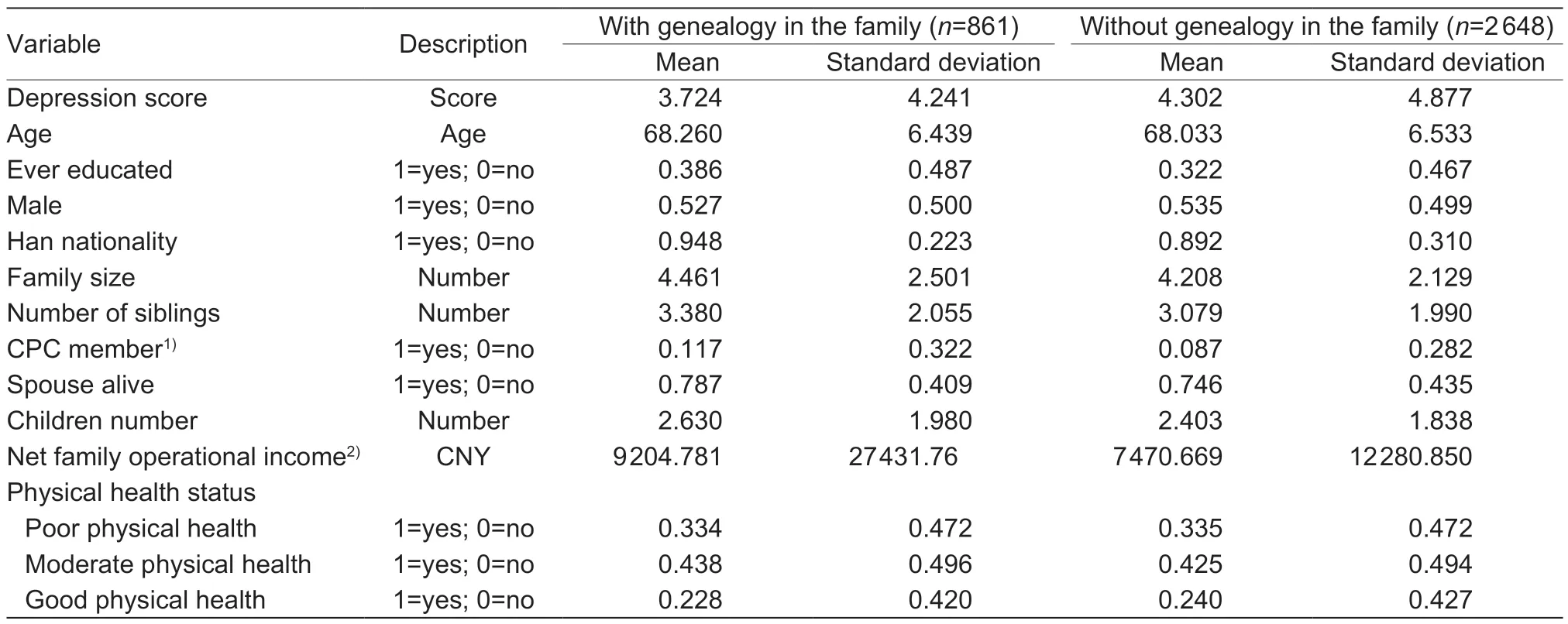
Table 1 Descriptive statistics of variables
Preliminary analysis of the relationship between clan culture and the depression of the elderly in rural China indicated that individuals with a family genealogy had lower depression scores (Fig.2). Specifically,the average depression score of elderly people who have a genealogy in the family was 3.7,while the average depression score of elderly people without such a genealogy was 4.3. There was a statistically significant difference in depression scores between the two groups (t-test;P<0.01). This finding preliminarily confirms Hypothesis I.
2.3.The empirical model
This study used the Ordinary Least Squares (OLS) model to estimate the impact of clan culture on the mental health of the elderly. The equation used was as follows:

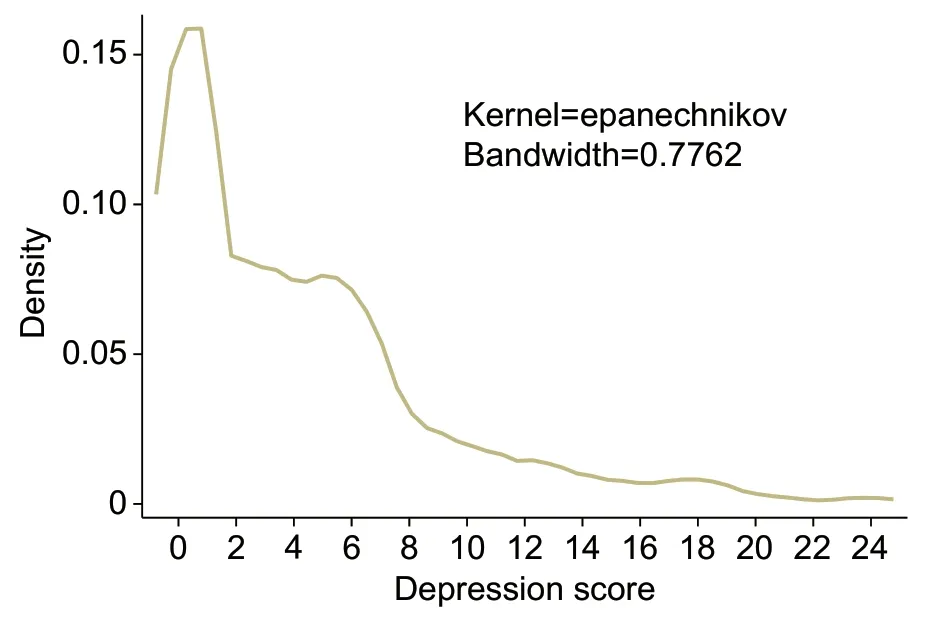
Fig.1 Depression scores of rural elderly.
Here,Yindicates the depression score,andClanrepresents the strength of the clan culture,which is represented by whether or not there is a genealogy in the family. Some studies have shown that women are more prone to depression than men (Parker and Brotchie 2010;Rempelet al.2019). Studies have also shown that age is closely associated with mental health (Mirowsky and Ross 1992). Individuals with higher education levels also usually have better mental health (Chevalier and Feinstein 2006).At the same time,individual’s with poor physical health also tend to have poor mental health. Studies have also shown that higher family income is associated with improved mental health (Caporaleet al.2009; Kouroukliset al.2020). In the current study,in order to further control for individual characteristics,variables such as individual ethnicity,whether the individual is a party member,whether their spouse is alive or not,family size,and child number were added to the model. Additional control variables included gender,age,education status,and ethnicity. Moreover,the analysis controlled for characteristics at the regional level:Countyrepresents the fixed effects for counties. In addition,εis a random disturbance term,irepresents the individual,jrepresents the county where the individual is located,andα1indicates the impact of clan culture on the rural elderly’s depression score. The results of the descriptive analysis of the samples are shown in Table 1.
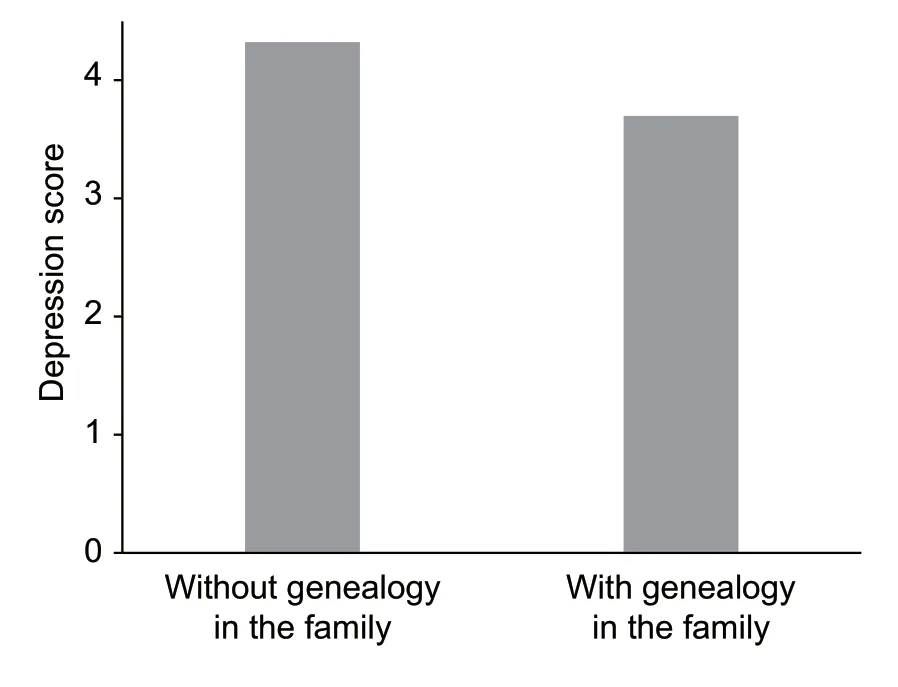
Fig.2 The primary relationship between clan culture and depression scores.
3.Results
3.1.The impact of clan culture on the depression of rural elderly
Table 2 shows the effect of genealogy,here used as a proxy variable for clan culture,on the depression scores of the rural elderly. The average depression score of elderly people in rural regions who have a genealogy in the family was 0.579 point lower than the score for rural elderly who lack such a genealogy (row 1,column 1). The average depression score of the elderly in rural areas was 4.2,indicating that clan culture plays an important role in reducing the depression score of the elderly. After controlling for individual characteristics,family characteristics,and the county fixed effects (column 2),clan culture still had a significant and considerable positive impact on the mental health of rural elderly. More precisely,even after controlling for these other characteristics,having a genealogy in the family reduced the average elderly depression score by 0.422 point (row 1,column 2).
The results obtained using the other control variables are also in line with the expectations. The older the individual,the higher the depression score. However,if older individuals have had access to education,their mental health is likely to be significantly improved. Furthermore,the mental health of elderly women in rural areas was worse than that of elderly men. Further,those who had a living spouse had reduced depression scores. Likewise,better family economic conditions were associated with lower depression scores of the elderly family member. Better physical health was also associated with significantly lowerdepression scores among the rural elderly.
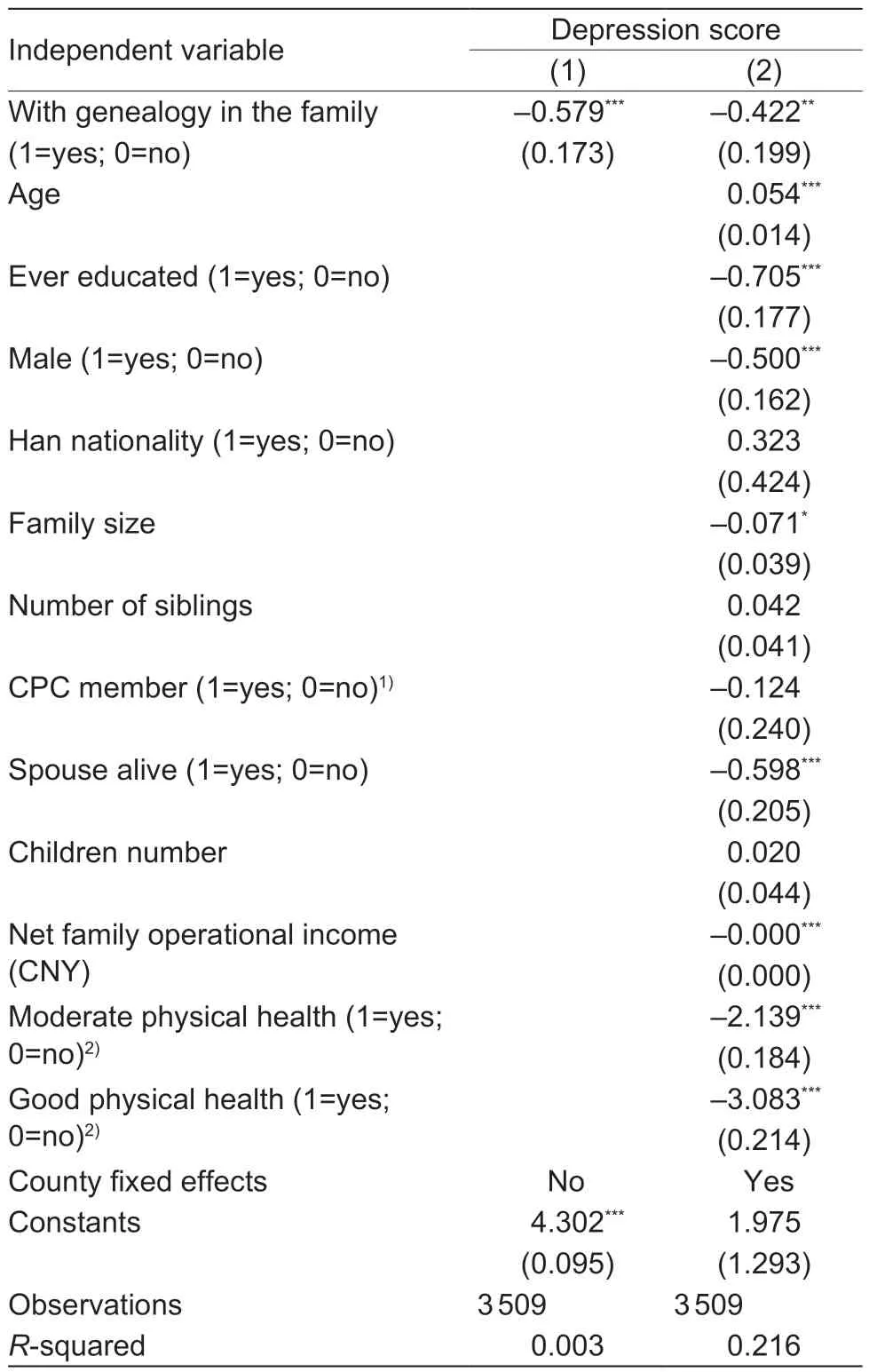
Table 2 The impact of clan culture on depression score
3.2.The impact of clan culture on the depression of the elderly by index
Table 2 explores the influence of clan culture on comprehensive depression scores. However,it is possible that this result may be driven by only one of the indicators used in the K6 scale. Following the research paradigm in Chenet al.(2018),in order to verify whether this possible situation was indeed the case,we conducted a regression analysis of all six indicators in the K6 scale (Table 3). We found that clan culture had a positive impact on all six depression indicators. Although the influence of clan culture on two of the indicators -namely,emotional depression,mental stress,and restlessness and feel difficult -was not statistically significant,its effect on each score was still negative,which means that clan culture has at least a weakly positive impact on the mental health of the elderly with respect to these particular indicators. Therefore,we believe that the results of Table 2 are not driven by just one of the indicators in the K6 scale.
3.3.Further limiting the sample
Considering that clan culture is prevalent mainly among the Han Chinese,it is not appropriate to include a sample of areas inhabited by ethnic minorities (Zhang 2019b). Using the information collected in the CFPS data,we excluded those villages which are listed as being inhabited by ethnic minorities. After this exclusion,the regression results showed that the positive impact of clan culture on the depression of the rural elderly was unchanged (Table 4).Depression scores of elderly people with a genealogy in the family were 0.392 points lower than those of elderly people without such a genealogy (row 1,column 2).
3.4.Estimated result using instrumental variable method
Whether the family has a genealogy may be affected by several unobservable factors,and it is possible that these factors may also directly affect the mental health of the rural elderly. Therefore,we choose to adopt the instrumental variable method to further verify the robustness of the estimation results. When the proportion of families with genealogy is high in a particular sample,excluding one’s own family,then there is a greater probability that the genealogy belongs to one’s own family. Therefore,we believe that by constructing similar variables,the requirements for correlation can be adequately met. At the same time,the proportion of genealogies owned by families besides one’s own is an exogenous variable.Therefore,constructing new variables allows us to meet the requirements of instrumental variables. Specifically,if the proportion of sample households that have genealogies,excluding one’s own family,is greater than or equal to 50%,this variable is assigned to the value of 1,and if it is less than 50%,it is assigned to the value of 0. The estimated results are shown in Table 5. The first-stage estimation results show that the instrumental variables we selected are appropriate.Additionally,the results of the second stage show that clan culture does indeed help to reduce depression scores.Overall,the results of the OLS estimation underestimate the effect of clan culture on the mental health of the rural elderly.
3.5.Is there any gender difference with respect to the influence of clan culture?
In Chinese traditions,especially in rural areas,clan culture is dominated by men,and men are considered to be the continuation of family blood; such continuation is the key focus of Chinese clan culture (Zhang and Ma 2017). Men usually have more discourse power and higher family status within the clan. Therefore,we posed the following questions:Is the positive effect of clan culture on the mental health of the rural elderly limited to men. If not,is the positive impact on elderly men’s mental health greater than that on elderly women’s mental health in rural areas? The study further analyzed whether clan culture has a differentiated effect on elderly individuals of different genders. The cross term between gender and whether there is genealogy in the family was added to the model and the results in Table 6 show that there was no significant difference in the influence of clan culture on the mental health of elderly men and women(row 2,columns 1 and 2). The influence of clan culture on the mental health of the rural elderly was still significant(row 1,columns 1 and 2). In other words,clan culture can improve the mental health of both male and female elderly individuals. At the same time,consistent with expectations,men had lower depression scores than women. That is,the mental health of men was better than that of women.
3.6.Will the influence of clan culture on the mental health of the elderly in rural areas weaken with economic development?
As an important part of the informal system of social support,the function of clan culture may gradually fade away withthe improvement of the formal system. In order to further verify whether the impact of clan culture on mental health will change together with changes brought about by economic development,sample villages were classified according to two criteria. The first classification method involved dividing the sample villages into a high-income group and low-income group based on the annual per capita net income of the village (bounded by the mean value). The second classification involved dividing the villages into high-and low-floating population village groups (bounded by the mean ratio of the floating population) based on the number of migrants and the total number of residents in the village. The villages below the average of these two standards represent villages with relatively low income and villages that are relatively closed,respectively,with both of these measures being indicators of relatively poor economic development. The state of economic development usually indicates the degree of improvement to the formal system of social support. This assumption warrants the claim that the influence of the informal system of social support associated with clan culture -and that system’s positive effect on the mental health of the elderly -will vary among regions with different economic development levels.

Table 3 The influence of clan culture on sub-index of depression
The results showed that clan culture had a greater effect on improving the mental health of the rural elderly in lowincome villages and villages with a lower ratio of migrantpopulations (Table 7). The positive impact of clan culture on the mental health of the elderly in these two groups of villages was greater than the overall impact of clan culture on the mental health of the elderly estimated in Table 4(Table 7,row 1,columns 1 and 3). Further,even in the areas with better economic development,clan culture still appears to play an important role in improving the mental health of the elderly,although its impact was no longer statistically significant (row 1,columns 2 and 4). These results fully demonstrate that clan culture and its informal institutions usually play a more important role in places where formal institutions are not perfect.
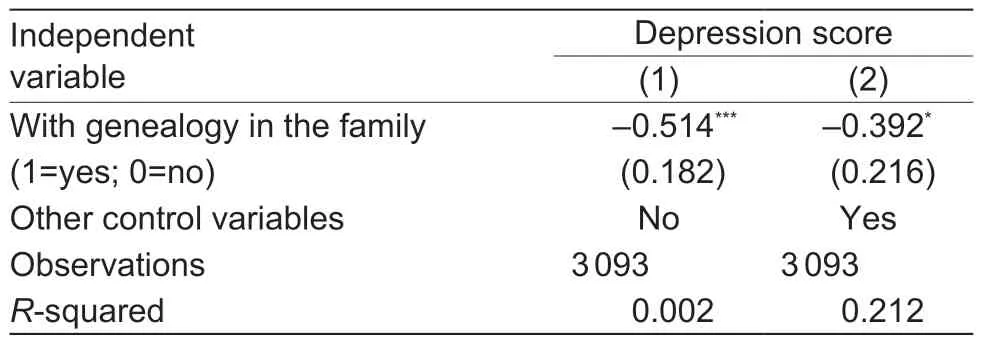
Table 4 The influence of clan culture on depression scores,excluding samples from ethnic minority areas
4.Discussion
Why does clan culture play a positive role in improving the mental health of the rural elderly? To explore the reasons,this paper analyzed the role of clan culture in rural areas from the perspective of social networks. Previous studies have shown that families with stronger social support networks can effectively resist risks,increase income,and promote residents’ entrepreneurship (Munshi and Rosenzweig 2010;Ma and Yang 2011; Wang J 2013). More importantly for this study,family social networks also improve residents’ mental health status (He 2002; Tao and Shen 2014). This paper argues that when families have a strong social network,the rural elderly will have more financial support,better daily care,and more personal interactions,with more beneficial effects on their physical and mental health.
Considering that the role and path of social networks when it comes to improving mental health is actually quite clear,here,we did not use empirical analysis to investigate the impact of social networks on mental health. Next,we will conduct an empirical analysis of the impact of clan culture on family social networks.
Social networks,trust,and norms constitute social capital(Ma and Yang 2011). Social networks are widely used in research in the social sciences because they are easier tomeasure than other elements of such social capital. For example,the number of relatives in cities (Yanget al.2011) and the number of friends in social networks (Ellisonet al.2007) are used to characterize the ownership status of social networks. The number of gifts received from relatives and friends during the Spring Festival is used to measure the social network status of the families in particular (Bian and Li 2005; Wang and Feng 2018).Building on previous research,this paper also used the family questionnaire of the CFPS survey to measure social networks by the number of relatives and friends who paid New Year visits during the Spring Festival,whether they received gift money the previous year,and the amount of gift money received.

Table 5 The influence of clan culture on depression scores,IV
Fig.3 shows the preliminary relationship between clan culture and social networks. Specifically,it can be seen that older people with a genealogy in the family have wider social networks and receive more social support. The results of the empirical analysis reported in Table 8 confirm the conclusion suggested by Fig.3. That is,it can be seen that households with a genealogy in the family have a larger social network stock. More precisely,for elderly individuals with a genealogy in the family,the number of relatives and the number of friends visiting during the Spring Festival wasincreased on average by two persons and by more than one person,respectively,relative to those without a genealogy in the family. The probability of receiving gift money within the past year was increased by 4.4% (row 1,column 3),while the amount of gift money received was increased by 1 000 CNY (row 1,column 4). Thus,clan culture has a significant positive impact on the social network. In turn,it is reasonable to believe that social networks bridge the gap between clan culture and the mental health of the rural elderly.
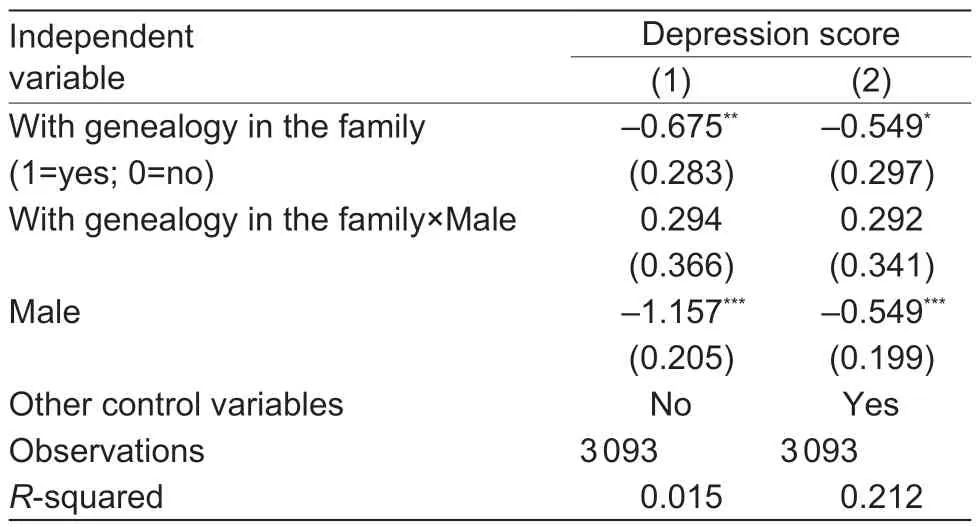
Table 6 The impact of clan culture on depression scores by gender
5.Conclusion and policy recommendations
China’s aging population is increasingly pronounced,with the aging population in rural areas posing more serious concerns. “Healthy aging” is the only way for China to cope with issues associated with its aging population.Strategies for improving the health of the older population should be highlighted. Rural areas in China are marked by inadequate social welfare and medical security; hence,paying attention to the mental health of the rural elderly is of great significance not only for improving their own welfare,but also for improving the living conditions of rural families.In rural areas where the formal system of social support is still lacking,and where clan culture is an important part of the informal support system,it is important to explore the effects of such culture on the mental health of the elderly.Doing so can provide a fuller understanding of the social circumstances in rural areas of China,illuminating the role of informal systems of social support in those areas. This paper is not devoted to exploring whether clan culture is beneficial to China’s modernization,but to analyzing the role of clan culture from a specific and targeted perspective.
This study used data from the CFPS survey conducted in 2010 to explore the impact of clan culture on the depression of the rural elderly in China. The estimations show that clan culture has a significant positive impact on the depression of the rural elderly. Likewise,clan culture has a positive impact on the depression of both elderly females andelderly males. This study also indicates that clan culture plays a key role in improving rural elderly health in villages where the formal system of social support is not perfect.However,with the development of the economy,the role of informal institutions of the sort associated with clan culture is gradually diminishing. This paper also explored the mechanism behind the positive influence of clan culture from the perspective of family social networks and found that clan culture can significantly broaden the family social network of rural elderly individuals.

Table 7 The impact of clan culture on the mental health of the elderly in different economic development areas
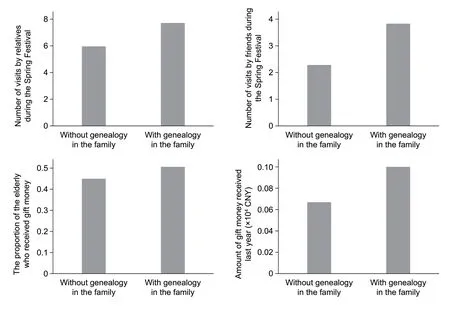
Fig.3 The relationship between clan culture and social networks.

Table 8 The impact of clan culture on social network
The findings of this paper have important policy implications. Firstly,policymakers should fully recognize that in less developed regions,informal institutions like clan culture constitute important supplements to formal institutions and play a key role in improving residents’welfare. Policymakers should bring these informal systems of social support more fully into play. Secondly,given that clan culture improves the mental health of elderly rural residents through the expansion of social networks,the government should advocate diversified activities that will make up for the lack of social networks among some groups in rural areas. Finally,clan culture,as an informal support system that plays an active role in the mental health of the rural elderly is worth considering in and of itself by policymakers. The power of non-marketization lurks in every corner of individual and social welfare.Therefore,future research needs to explore more deeply the impact and efficiency of the informal systems of social support that demonstrate this power. More importantly,attaching importance to the improvement of the mental health of residents by the informal system will help reduce the possibility of residents returning to poverty,thereby effectively alleviating relative poverty due to mental health diseases.
Acknowledgements
We acknowledge the financial support provided by the Fundamental Research Funds for the Central Universities,China (BLX201945). We thank the Institute of Social Science Survey of Peking University,China for providing data support. Thanks to Dr.Bai Yunli,Dr.Xu Xiangbo,Dr.Sun Mingxing,and Ms.Qu Qinghe from the Key Laboratory of Ecosystem Network Observation and Modelling,Institute of Geographic Sciences and Natural Resources Research,Chinese Academy of Sciences for their constructive suggestions.
Declaration of competing interest
The authors declare that they have no conflict of interest.
杂志排行
Journal of Integrative Agriculture的其它文章
- Paths out of poverty
- Does empowering women benefit poverty reduction? Evidence from a multi-component program in the lnner Mongolia Autonomous Region of China
- Status and path of intergenerational transmission of poverty in rural China:A human capital investment perspective
- The impact of the New Rural Cooperative Medical Scheme on the“health poverty alleviation” of rural households in China
- The effects of social security expenditure on reducing income inequality and rural poverty in China
- Synthesize dual goals:A study on China’s ecological poverty alleviation system
